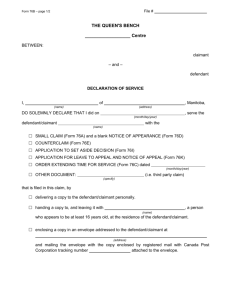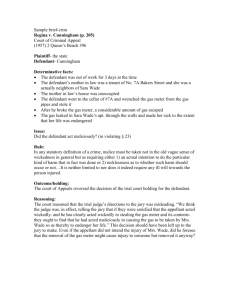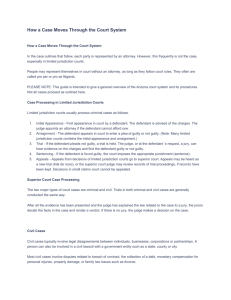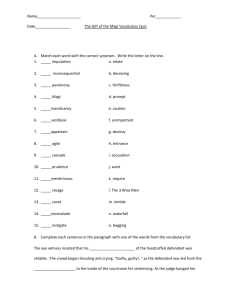CIVIL PROCEDURE IN ENGLAND AND WALES
advertisement
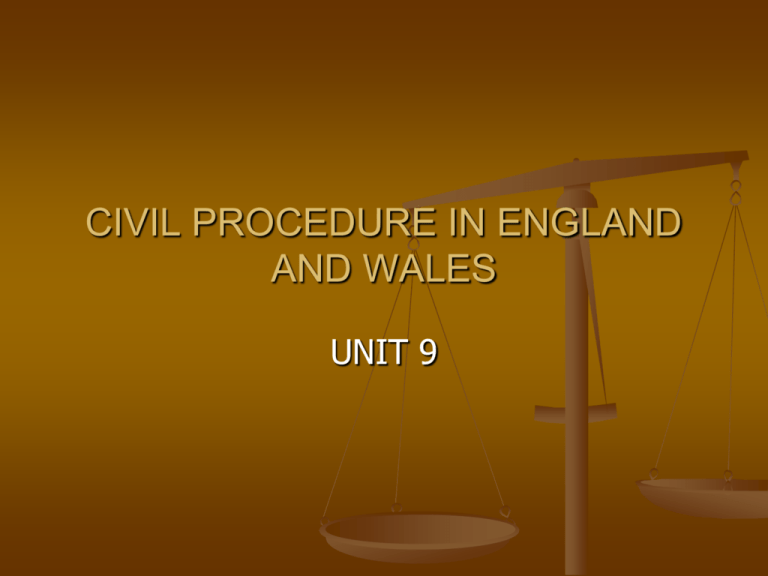
CIVIL PROCEDURE IN ENGLAND AND WALES UNIT 9 Preview Civil vs. criminal procedure Adversary procedure History Major problems Lord Woolf’s reforms Civil proceedings Civil vs. Criminal law Civil Law: laws relating to people’s rights and to agreements between individuals; disputes between individuals; action is taken by the aggrieved party. Criminal Law: law relating to crime: illegal conduct for which a person may be prosecuted and punished by the state; offences which, though committed against an individual, are regarded as harmful to society as a whole; action is taken against the wrong-doer in the name of society. ADVERSARY PROCESS Type of litigation, characteristic of the common law: parties are set up against each other, as if they were opponents in a battle. The parties in a civil case: equally matched opponents, responsible for preparing their own side of the case and finding their witnesses and evidence, with little or no involvement by the court The function of the judge: to hear both sides and pass judgment Standard of proof Criminal cases: beyond reasonable doubt Civil cases: on the balance of probabilities Standard of proof: criminal case The prosecution must make the court sure that the defendant is guilty. If the court is not sure, it must acquit the defendant, even if it finds that he was probably guilty Standard of proof It is always easier to make someone else believe that something is probably so than to make them sure of it; it is easier to prove a civil case than it is to prove a criminal case Civil vs. Criminal law Civil cases Criminal cases Purpose To enforce rights To decide if criminal law has been broken Person starting case Injured party: claimant The State: Crown Prosecution Service: prosector Courts County court High Court Magistrates’ courts Crown Court Standard of proof On the balance of probabilities Beyond reasonable doubt Persons deciding judge Magistrates; Crown Court: judge, jury decision Judgment for the claimant (or defendant) Guilty or not guilty Powers of the court Damages, injunction Prison, community sentence, fine, discharge History End of 18th century: civil matters dealt with by several different courts Separate, often overlapping jurisdictions Largley centralised in London No coordination, inefficiency, incompetence, delays Litigation in the higher courts: extravagance which could be afforded only by the very rich Charles Dickens, Bleak House (1853) “Jarndyce v. Jarndyce drones on. This scarecrow of a suit has, in the course of time, become so complicated that no man alive knows what it means. The parties to it understand it least; but it has been observed that no two Chancery lawyers can talk about it for five minutes without coming to total disagreement as to all the premises. Charles Dickens, Bleak House (1853) Innumerable children have been born into the cause; innumerable young people have married into it; innumerable old people have died out of it. Scores of persons have deliriously found themselves parties in Jarndyce v. Jarndyce, without knowing how or why; whole families have inherited legendary hatreds with the suit. Charles Dickens, Bleak House (1853) The little plaintiff or defendant, who was promised a new rocking horse when Jarndyce v. Jarndyce should be settled, has grown up, possessed himself of a real horse, and trotted away into the other world. Fair wards of court have faded into grandmothers; a long procession of Chancellors has come in and gone out… Charles Dickens, Bleak House (1853) …there are not three Jarndyces left upon the earth perhaps, since old Tom Jarndyce in despair blew his brains out at a coffeehouse in Chancery Lane; but Jarndyce v. Jarndyce still drags its dreary length before the Court, perennially hopeless.” The Civil Justice Review (1988) Delay in litigation “causes continuing personal stress, anxiety and financial hardship to ordinary people and their families. It may induce economically weaker parties to accept unfair settlements. It also frustrates the efficient conduct of commerce and industry” CURE Proposals for a system of interventionist court control of case progress with time limits, reminders being sent to solicitors and a penalty for non-compliance A significant move towards judicial interventionism to a degree unknown so far to the English legal system Lord Woolf’s Reforms (1999) The system: “in a state of crisis…a crisis for the government, the judiciary and the profession” Lord Woolf’s Reforms (1999) “Without effective judicial control…the adversarial process is likely to encourage an adversarial culture and to degenerate into an environment in which the litigation process is too often seen as a battlefield where no rules apply. In this environment, questions of expense, delay, compromise and fairness have only a low priority. The consequence is that the expense is often excessive, disproportionate and unpredictable; and delay is frequently unreasonable” Costs A successful claim by a supplier of fitted kitchens to stop a ₤ 10,000 a year employee from taking up a job with a competitor cost the employer ₤ 100,000 A divorced wife had to pay ₤ 34,000 in costs for a judgement that awarded her ₤ 52,000 of the value of the family home The legal aid budget rose from ₤ 426 million in 1987 to ₤ 1,526 million in 1997 Civil Procedure Rules (CPR) Before the CPR, it was up to the parties and their legal advisers to progress the case, decide what issues they wanted to have heard, and to present evidence Under the CPR: the judge manages the case: sets the timetable, controls and tries to simplify the issues to be decided; puts limits on the evidence which may be called at the trial Civil Procedure Rules (CPR) The court has ‘an overriding objective to deal with cases justly’ by: Ensuring that the parties are on ‘equal footing’ Saving expense Dealing with cases in ways which are proportionate to the amount of money involved, the complexity of the issues, and the financial position of each party Ensuring that the case is dealt with promptly and fairly Plain English Plaintiff > claimant Writ > claim form Discovery > disclosure Statement of claim > particulars of claim SETTLEMENT Most civil cases are settled out of court, trial being the “ultimate weapon” in the battle Of those cases where proceedings are commenced, only a small percentage come to trial Most civil disputes are settled between the parties, usually by their solicitors before proceedings have started The monetary level of settlements is lower than damages awarded by courts The proceedings Claim form states the nature of the claim and the remedy; must be served upon the defendant The defendant may admit the claim and pay the full amount If a defendant wishes to defend the claim he must file a document with the court setting out his answer to the claim; he may file a counterclaim Default judgement If a defendant does not reply to the claim, the claimant may obtain a default judgment . The court will award judgment in his favour without the trial Summary judgment If a defendant wishes to defend the claim, but he has no real defence to it, the court may decide the claim without a trial by giving summary judgment The court may give summary judgment against the claimant if it appears that his claim has no reasonable prospect of succeeding The three tracks The small claims track: for claims of up to ₤ 5,000; claims dealt with swiftly and informally by a District Judge The fast track: amount does not exceed ₤ 15,000, and the trial is not likely to last longer than 1 day; heard by a District Judge or Circuit Judge The multi-track: complicated and valuable claims; heard by a Circuit Judge or High Court Judge HIERARCHY OF CIVIL COURTS Supreme Court Supreme Court Judges COURT OF APPEAL CIVIL DIVISION Lords Justices of Appeal HIGH COURT CHANCERY DIVISION Tax, probate, bankruptcy, property, trusts Patents Court, Companies Court FAMILY DIVISION Divorce, matrimonial property, guardianship COUNTY COURT Circuit judges, district judges QUEEN’S BENCH DIVISION Contracts, tort etc. Admiralty Court Commercial Court COUNTY COURT OR HIGH COURT? - - The County Court should try: Any action worth less than ₤ 15.000 The High Court should try: Actions over ₤ 15,000 Methods of dispute resolution alternative dispute resolution/litigation Negotiation Parties themselves Mediation Parties with help of neutral third party Conciliation Parties with help of neutral third party who plays an active role in suggesting a solution Arbitration Parties agree to let third party make a binding decision Litigation Parties go to court and a judge decides the case Civil cases Tried by judges alone Juries try civil cases when the action concerns the liberty of the subject or his/her reputation Liberty of the subject Example: when a claimant claims compensation against the police for assault and wrongful imprisonment Reputation Example: the claimant claims damages for defamation of character . Where s/he alleges that unpleasant and untrue things have been written or said about him/her that have damaged their reputation Jury trials in defamation cases Jurors – no experience in assessing damages; sometimes make extraordinarily high awards: Sonia Sutcliffe, the wife of Peter Sutcliffe (the serial killer known as the ‘Yorkshire Ripper’) successfully sued the magazine Private Eye for defamation – it had been suggested that she might have known sth of her husband’s activities – the jury awarded her ₤ 600,000 damages; reduced on appeal to ₤ 60,000 Jury trials in defamation cases In 2001 the Court of Appeal set aside altogether a jury award of £85,000 damages to the footballer Bruce Grobelaar. The goalkeeper had sued the Sun newspaper for defamation after it had accused him of accepting corrupt payments to ‘throw matches’; the Court of Appeal held the jury had reached a ‘perverse decision’, and reversed the decision. Jury trials in defamation cases This unprecedented ruling was criticised as undermining the jury system. The case went to the House of Lords. The Law Lords allowed this appeal; they did not disturb the jury’s finding that Grobelaar had been defamed, but reduced the damages to a nominal sum of £ 1. Enforcing court orders in civil cases In the case of an order to pay money, the defendant’s property can be seized and sold, or there may be an order declaring him bankrupt If a person disobeys any court order, s/he will be guilty of contempt of court; punishment: fine or committal to prison Contempt of court In 1995 a woman of 68 came before the court She had committed a nuisance by throwing large amounts of bread around the house to feed the birds, which flocked to her home This became a health hazard Despite several warnings by the court that her behaviour was unlawful, she persisted Contempt of court The court granted an injunction ordering her not to do this She disobeyed the order Committed to prison for contempt of court After a few days apologized to the court and promised not to do it again The court decided that she had ‘purged her contempt’ and she was released APPEAL Either party or both may appeal; even the prevailing party may appeal if they want a larger award than was granted Appeals from the High Court and county courts are heard by the Court of Appeal (Civil Division) A case which has been dismissed by the Appeal Court can, with the permission of the Appeal Court, be taken to the Supreme Court; if an important legal principle is at stake, the Supreme Court can give permission for an appeal even if the Appeal Court has not done so APPEAL The appellate court can: Affirm the judgement Reverse (change a decision to the opposite one) Remand: send the lawsuit back to the lower trial court to address an unresolved issue, or possibly for a whole new trial Summary Courts dealing with civil cases County Court High Court Different tracks for claims Small claims Fast track Multi-track Problems of civil cases Cost Delay complexity 1999 reforms Encourage use of alternative dispute resolution Simpler forms and language Small claims limit: £ 5,000 Fast track: £ 5,000- £15,000 Multi-track: over £15,000 Judges responsible for case management Strict timetables Key facts Remedy Effect Comment Damages Defendant must pay a Special d.: specific certain amount of money amounts General: for pain and suffering Nominal: small amount, no actual loss Exemplary: to punish defendant Injunctions Order defendant to do or Discretionary remedy; not to do sth court may decide that damages are sufficient Specific performance Orders defendant to complete contract Discretionary remedy; rare Recission Puts parties back to precontractual position Discretionary remedy Rectification Alters document to show Discretionary remedy Activity Selina bought a washing machine for L350. It has developed several minor faults including a leak. Selina complained to the store where she bought the machine. They offered to replace it but refused to refund her money. Selina wants to return the machine and claim the cost. Advise Selina as to which court she must start proceedings in and to which track the case is likely to be allocated Activity Tyler was seriously injred when a car mounted a pavement and hit him as he was waiting for a bus. He estimates his claim as being for about L85,000. Advise him as to which court he may commence his claim in, the track to which it will be allocated Activity Wallace wishes to sue a local newspaper for defamation. He is prepared to limit his claim to L20.000. Advise him as to which court he may commence his claim and the track to which it is likely be allocated SUMMARY: claim, defendant, judgement, plaintiff, probabilities. A civil action in the county court or the High Court is started by the ___(claimant) serving documents, which contain details of a__, on the defendant. Should the__ defend the action, the court is informed; relevant papers are prepared, circulated to all parties, and the case proceeds to trial and __. A decision in civil cases is reached on the balance of ___. Key A civil action in the county court or the High Court is started by the plaintiff (claimant) serving documents, which contain details of a claim, on the defendant. Should the defendant defend the action, the court is informed; relevant papers are prepared, circulated to all parties, and the case proceeds to trial and judgement. A decision in civil cases is reached on the balance of probabilities. action, costs, delays, litigation, settled The court also decides the expenses of the__, and the loser is usually expected to pay both his own and the opponent’s __. Civil __ can be complicated, expensive and subject to great delay in the High Court. It is therefore advisable for disputes to be __out of court, or before the case actually comes to trial. Attempts are being made to reorganize civil law procedures because of concern about the efficiency of the system, with its __, expense and complexity. Key The court also decides the expenses of the action, and the loser is usually expected to pay both his own and the opponent’s costs. Civil litigation can be complicated, expensive and subject to great delay in the High Court. It is therefore advisable for disputes to be settled out of court, or before the case actually comes to trial. Attempts are being made to reorganize civil law procedures because of concern about the efficiency of the system, with its delays, expense and complexity. LEGAL TERMS Action a proceeding heard in a civil court allowing an individual to pursue a legal right; to take legal action to begin a legal case; to defend an action to appear in court to state your case when accused of something LEGAL TERMS Claim an assertion of a legal right potraživanje, tužbeni zahtjev Counterclaim in a court, a claim by a defendant against whom a claimant is bringing a claim. The counterclaim is included in the same proceedings and statement of case as the original claim protutužba LEGAL TERMS Discovery of documents disclosure of each party's documents to the other before a hearing starts in the civil courts (Since the new Civil Procedure Rules in 1999, disclosure) To file to send a document to court (When a and served in 14 days the defence must be sent to court and to the other party within 14 days Podnijeti zahtjev sudu defendant is served with particulars of claim he can file a defence); the defence must be filed Legal terms Injunction a court order telling someone to stop doing something, or not to do something Sudski nalog LEGAL TERMS Judgment by default a judgment without trial against defendant who fails to respond to a claim Presuda zbog izostanka, kontumacijska presuda Judicial review a review by a higher court of the actions of a lower court Sudska kontrola Legal terms Plaintiff person who starts an action against someone in civil courts (Since the introduction of the new Civil Procedure Rules in April 1999, claimant) Tužitelj u građanskom postupku LEGAL TERMS Pleadings documents setting out the claim of the claimant or the defence of the defendant, or giving the arguments which the two sides will use in proceedings (Pleadings must be submitted to the court when the action is set down for trial) podnesak Probate legal acceptance that a document, especially a will, is valid Sudska ovjera oporuke LEGAL TERMS Reverse to change a decision to the opposite one Poništiti presudu Serve to give someone a legal document that requires them to do something (They were served notice to quit the premises in two months' time); Uručiti, dostaviti Sue to start legal proceedings against someone to get compensation for a wrong Pokrenuti postupak Advise the people in the following situations: Thomas has been badly injured at work and alleges that the injuries were the result of his employer’s failure to take proper safety precautions. He has been advised that his claim is likely to be worth ₤ 200,000. Advise him as to which court or courts could hear his case. Activity Look up court forms such as claim form on the website: www.courtservice.gov.uk Also use that website to find guidance on starting cases in the County Court Activity Use the Internet to look up cases in which there has been an appeal to the Supreme Court and which are waiting for the appeal to be heard. This can be found on: www.supremecourt.gov.uk/news/judgments.html
